Report: Insights from a Mental Health Counselor Interview
VerifiedAdded on 2023/06/10
|7
|1629
|98
Report
AI Summary
This report provides a comprehensive overview of an interview conducted with a licensed mental health counselor in New Jersey. The interview explores various aspects of the counselor's career, including their roles and activities, which involve working with individuals, groups, and communities to improve mental health. The counselor discusses the common problems they address, such as substance abuse, depression, and LGBTQ issues, and highlights the growing demand for mental health services. Educational requirements, professional development, and ethical considerations, including confidentiality and interpersonal boundaries, are also discussed. The report emphasizes the importance of lifelong learning, critical thinking, and adherence to ethical guidelines in the field of mental health counseling. The counselor's experiences with the New Jersey branch of the American Counseling Association (NJCA) and issues faced, like reluctant patients and cultural diversity, are also included.
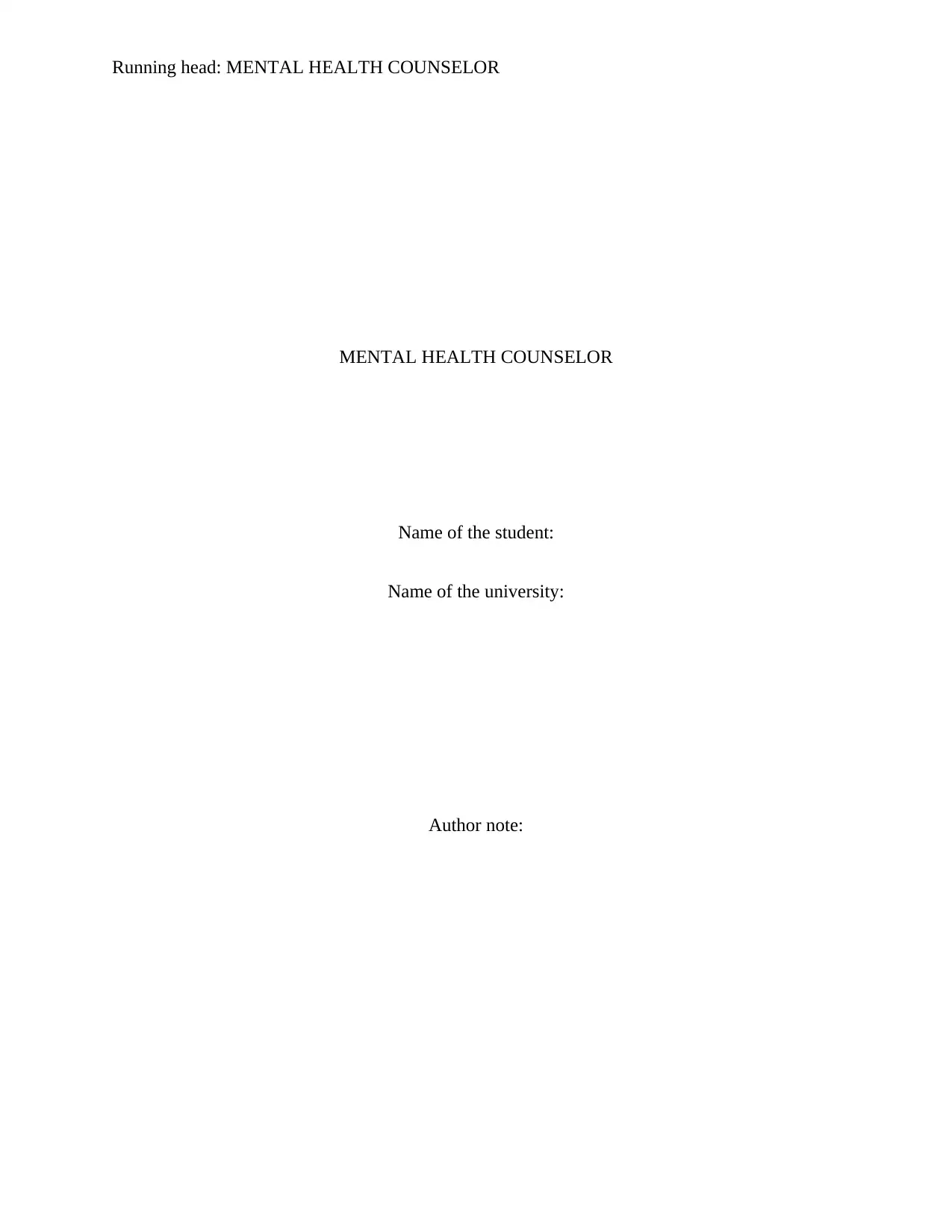
Running head: MENTAL HEALTH COUNSELOR
MENTAL HEALTH COUNSELOR
Name of the student:
Name of the university:
Author note:
MENTAL HEALTH COUNSELOR
Name of the student:
Name of the university:
Author note:
Paraphrase This Document
Need a fresh take? Get an instant paraphrase of this document with our AI Paraphraser
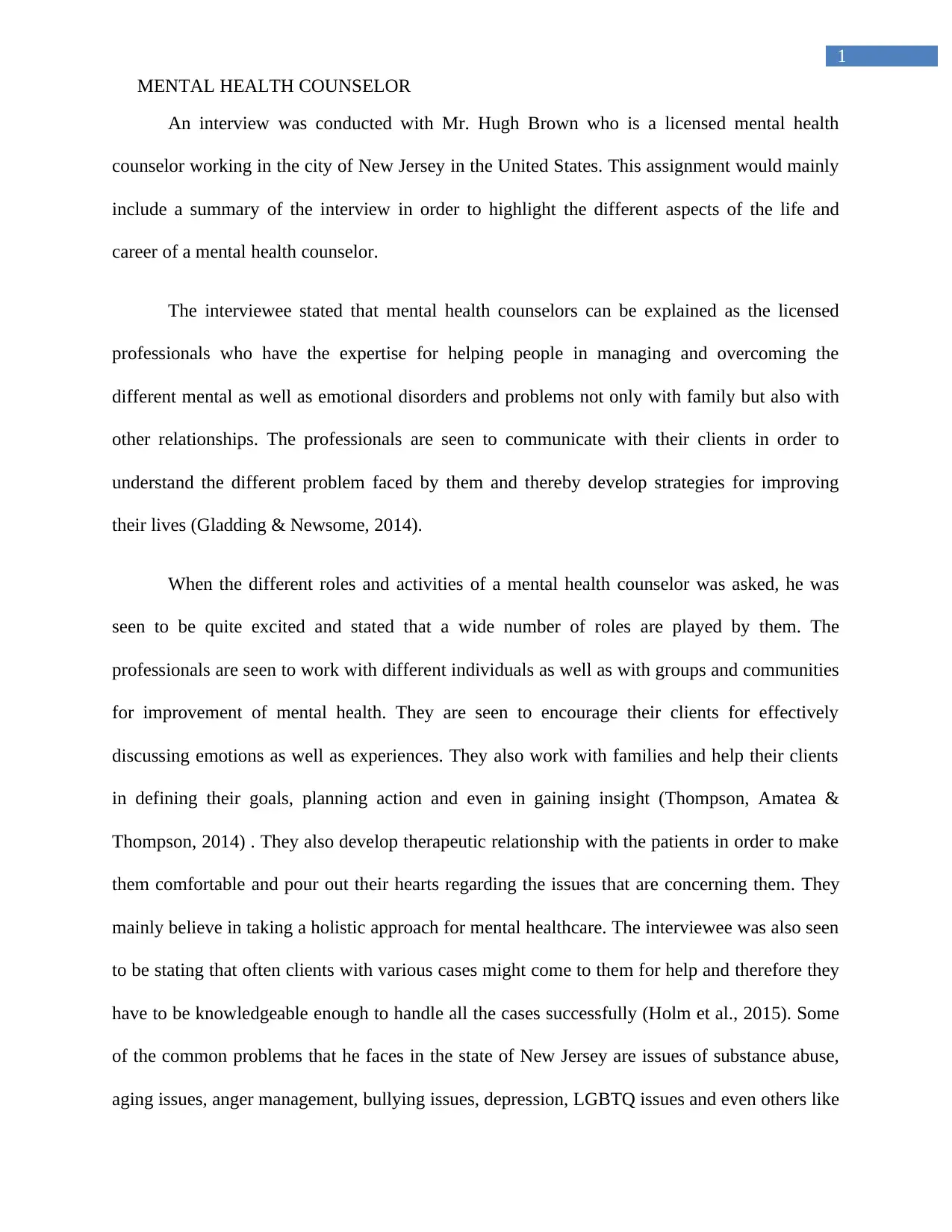
1
MENTAL HEALTH COUNSELOR
An interview was conducted with Mr. Hugh Brown who is a licensed mental health
counselor working in the city of New Jersey in the United States. This assignment would mainly
include a summary of the interview in order to highlight the different aspects of the life and
career of a mental health counselor.
The interviewee stated that mental health counselors can be explained as the licensed
professionals who have the expertise for helping people in managing and overcoming the
different mental as well as emotional disorders and problems not only with family but also with
other relationships. The professionals are seen to communicate with their clients in order to
understand the different problem faced by them and thereby develop strategies for improving
their lives (Gladding & Newsome, 2014).
When the different roles and activities of a mental health counselor was asked, he was
seen to be quite excited and stated that a wide number of roles are played by them. The
professionals are seen to work with different individuals as well as with groups and communities
for improvement of mental health. They are seen to encourage their clients for effectively
discussing emotions as well as experiences. They also work with families and help their clients
in defining their goals, planning action and even in gaining insight (Thompson, Amatea &
Thompson, 2014) . They also develop therapeutic relationship with the patients in order to make
them comfortable and pour out their hearts regarding the issues that are concerning them. They
mainly believe in taking a holistic approach for mental healthcare. The interviewee was also seen
to be stating that often clients with various cases might come to them for help and therefore they
have to be knowledgeable enough to handle all the cases successfully (Holm et al., 2015). Some
of the common problems that he faces in the state of New Jersey are issues of substance abuse,
aging issues, anger management, bullying issues, depression, LGBTQ issues and even others like
MENTAL HEALTH COUNSELOR
An interview was conducted with Mr. Hugh Brown who is a licensed mental health
counselor working in the city of New Jersey in the United States. This assignment would mainly
include a summary of the interview in order to highlight the different aspects of the life and
career of a mental health counselor.
The interviewee stated that mental health counselors can be explained as the licensed
professionals who have the expertise for helping people in managing and overcoming the
different mental as well as emotional disorders and problems not only with family but also with
other relationships. The professionals are seen to communicate with their clients in order to
understand the different problem faced by them and thereby develop strategies for improving
their lives (Gladding & Newsome, 2014).
When the different roles and activities of a mental health counselor was asked, he was
seen to be quite excited and stated that a wide number of roles are played by them. The
professionals are seen to work with different individuals as well as with groups and communities
for improvement of mental health. They are seen to encourage their clients for effectively
discussing emotions as well as experiences. They also work with families and help their clients
in defining their goals, planning action and even in gaining insight (Thompson, Amatea &
Thompson, 2014) . They also develop therapeutic relationship with the patients in order to make
them comfortable and pour out their hearts regarding the issues that are concerning them. They
mainly believe in taking a holistic approach for mental healthcare. The interviewee was also seen
to be stating that often clients with various cases might come to them for help and therefore they
have to be knowledgeable enough to handle all the cases successfully (Holm et al., 2015). Some
of the common problems that he faces in the state of New Jersey are issues of substance abuse,
aging issues, anger management, bullying issues, depression, LGBTQ issues and even others like
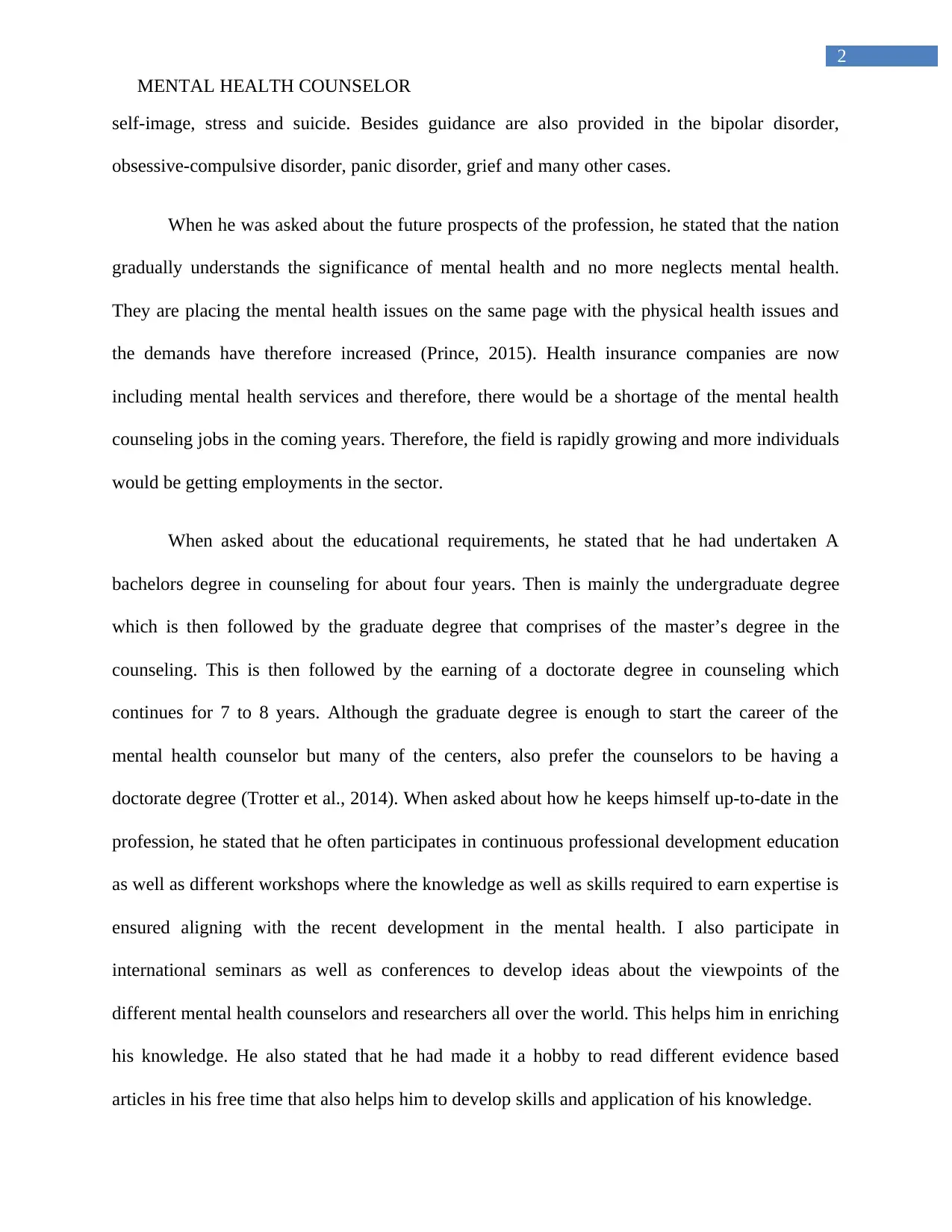
2
MENTAL HEALTH COUNSELOR
self-image, stress and suicide. Besides guidance are also provided in the bipolar disorder,
obsessive-compulsive disorder, panic disorder, grief and many other cases.
When he was asked about the future prospects of the profession, he stated that the nation
gradually understands the significance of mental health and no more neglects mental health.
They are placing the mental health issues on the same page with the physical health issues and
the demands have therefore increased (Prince, 2015). Health insurance companies are now
including mental health services and therefore, there would be a shortage of the mental health
counseling jobs in the coming years. Therefore, the field is rapidly growing and more individuals
would be getting employments in the sector.
When asked about the educational requirements, he stated that he had undertaken A
bachelors degree in counseling for about four years. Then is mainly the undergraduate degree
which is then followed by the graduate degree that comprises of the master’s degree in the
counseling. This is then followed by the earning of a doctorate degree in counseling which
continues for 7 to 8 years. Although the graduate degree is enough to start the career of the
mental health counselor but many of the centers, also prefer the counselors to be having a
doctorate degree (Trotter et al., 2014). When asked about how he keeps himself up-to-date in the
profession, he stated that he often participates in continuous professional development education
as well as different workshops where the knowledge as well as skills required to earn expertise is
ensured aligning with the recent development in the mental health. I also participate in
international seminars as well as conferences to develop ideas about the viewpoints of the
different mental health counselors and researchers all over the world. This helps him in enriching
his knowledge. He also stated that he had made it a hobby to read different evidence based
articles in his free time that also helps him to develop skills and application of his knowledge.
MENTAL HEALTH COUNSELOR
self-image, stress and suicide. Besides guidance are also provided in the bipolar disorder,
obsessive-compulsive disorder, panic disorder, grief and many other cases.
When he was asked about the future prospects of the profession, he stated that the nation
gradually understands the significance of mental health and no more neglects mental health.
They are placing the mental health issues on the same page with the physical health issues and
the demands have therefore increased (Prince, 2015). Health insurance companies are now
including mental health services and therefore, there would be a shortage of the mental health
counseling jobs in the coming years. Therefore, the field is rapidly growing and more individuals
would be getting employments in the sector.
When asked about the educational requirements, he stated that he had undertaken A
bachelors degree in counseling for about four years. Then is mainly the undergraduate degree
which is then followed by the graduate degree that comprises of the master’s degree in the
counseling. This is then followed by the earning of a doctorate degree in counseling which
continues for 7 to 8 years. Although the graduate degree is enough to start the career of the
mental health counselor but many of the centers, also prefer the counselors to be having a
doctorate degree (Trotter et al., 2014). When asked about how he keeps himself up-to-date in the
profession, he stated that he often participates in continuous professional development education
as well as different workshops where the knowledge as well as skills required to earn expertise is
ensured aligning with the recent development in the mental health. I also participate in
international seminars as well as conferences to develop ideas about the viewpoints of the
different mental health counselors and researchers all over the world. This helps him in enriching
his knowledge. He also stated that he had made it a hobby to read different evidence based
articles in his free time that also helps him to develop skills and application of his knowledge.
⊘ This is a preview!⊘
Do you want full access?
Subscribe today to unlock all pages.

Trusted by 1+ million students worldwide
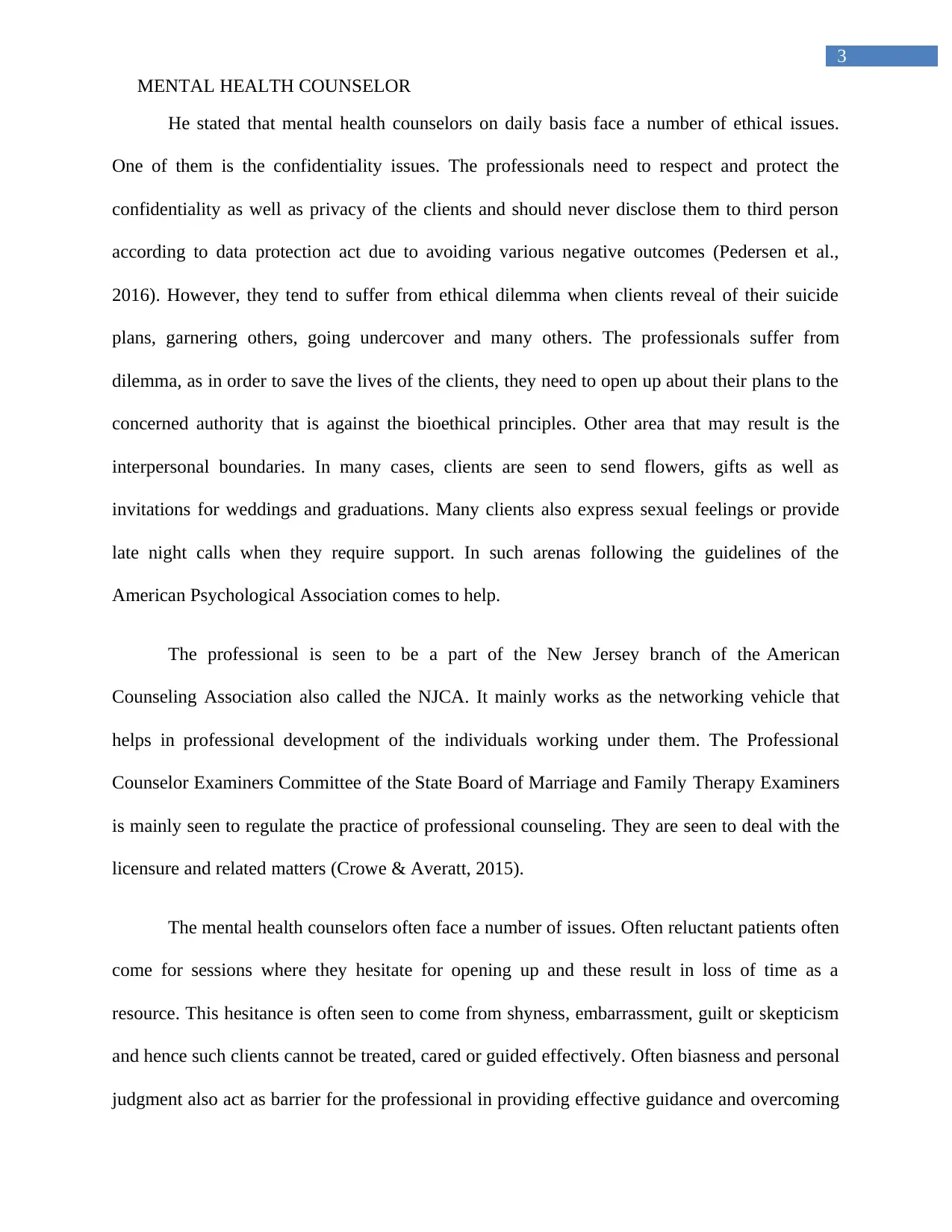
3
MENTAL HEALTH COUNSELOR
He stated that mental health counselors on daily basis face a number of ethical issues.
One of them is the confidentiality issues. The professionals need to respect and protect the
confidentiality as well as privacy of the clients and should never disclose them to third person
according to data protection act due to avoiding various negative outcomes (Pedersen et al.,
2016). However, they tend to suffer from ethical dilemma when clients reveal of their suicide
plans, garnering others, going undercover and many others. The professionals suffer from
dilemma, as in order to save the lives of the clients, they need to open up about their plans to the
concerned authority that is against the bioethical principles. Other area that may result is the
interpersonal boundaries. In many cases, clients are seen to send flowers, gifts as well as
invitations for weddings and graduations. Many clients also express sexual feelings or provide
late night calls when they require support. In such arenas following the guidelines of the
American Psychological Association comes to help.
The professional is seen to be a part of the New Jersey branch of the American
Counseling Association also called the NJCA. It mainly works as the networking vehicle that
helps in professional development of the individuals working under them. The Professional
Counselor Examiners Committee of the State Board of Marriage and Family Therapy Examiners
is mainly seen to regulate the practice of professional counseling. They are seen to deal with the
licensure and related matters (Crowe & Averatt, 2015).
The mental health counselors often face a number of issues. Often reluctant patients often
come for sessions where they hesitate for opening up and these result in loss of time as a
resource. This hesitance is often seen to come from shyness, embarrassment, guilt or skepticism
and hence such clients cannot be treated, cared or guided effectively. Often biasness and personal
judgment also act as barrier for the professional in providing effective guidance and overcoming
MENTAL HEALTH COUNSELOR
He stated that mental health counselors on daily basis face a number of ethical issues.
One of them is the confidentiality issues. The professionals need to respect and protect the
confidentiality as well as privacy of the clients and should never disclose them to third person
according to data protection act due to avoiding various negative outcomes (Pedersen et al.,
2016). However, they tend to suffer from ethical dilemma when clients reveal of their suicide
plans, garnering others, going undercover and many others. The professionals suffer from
dilemma, as in order to save the lives of the clients, they need to open up about their plans to the
concerned authority that is against the bioethical principles. Other area that may result is the
interpersonal boundaries. In many cases, clients are seen to send flowers, gifts as well as
invitations for weddings and graduations. Many clients also express sexual feelings or provide
late night calls when they require support. In such arenas following the guidelines of the
American Psychological Association comes to help.
The professional is seen to be a part of the New Jersey branch of the American
Counseling Association also called the NJCA. It mainly works as the networking vehicle that
helps in professional development of the individuals working under them. The Professional
Counselor Examiners Committee of the State Board of Marriage and Family Therapy Examiners
is mainly seen to regulate the practice of professional counseling. They are seen to deal with the
licensure and related matters (Crowe & Averatt, 2015).
The mental health counselors often face a number of issues. Often reluctant patients often
come for sessions where they hesitate for opening up and these result in loss of time as a
resource. This hesitance is often seen to come from shyness, embarrassment, guilt or skepticism
and hence such clients cannot be treated, cared or guided effectively. Often biasness and personal
judgment also act as barrier for the professional in providing effective guidance and overcoming
Paraphrase This Document
Need a fresh take? Get an instant paraphrase of this document with our AI Paraphraser
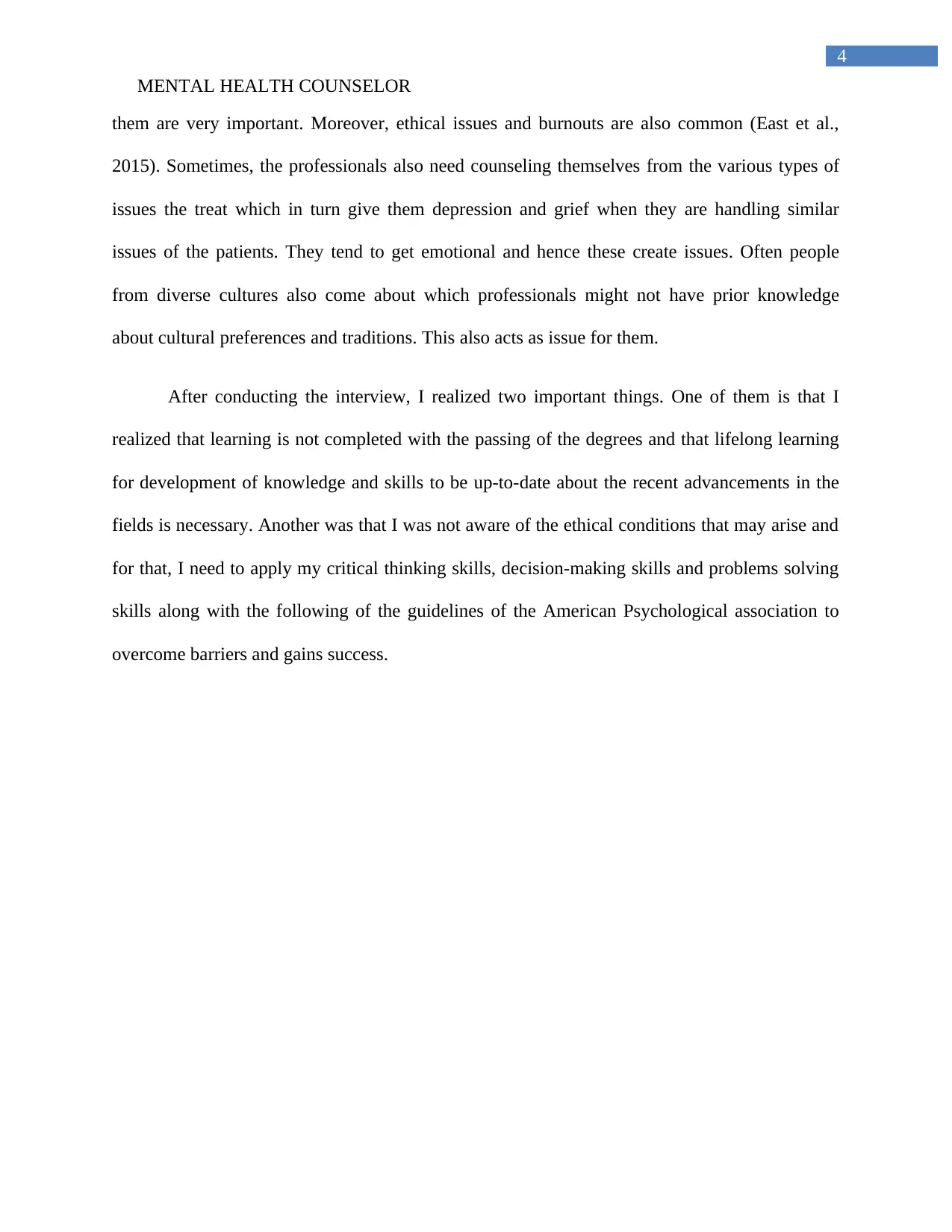
4
MENTAL HEALTH COUNSELOR
them are very important. Moreover, ethical issues and burnouts are also common (East et al.,
2015). Sometimes, the professionals also need counseling themselves from the various types of
issues the treat which in turn give them depression and grief when they are handling similar
issues of the patients. They tend to get emotional and hence these create issues. Often people
from diverse cultures also come about which professionals might not have prior knowledge
about cultural preferences and traditions. This also acts as issue for them.
After conducting the interview, I realized two important things. One of them is that I
realized that learning is not completed with the passing of the degrees and that lifelong learning
for development of knowledge and skills to be up-to-date about the recent advancements in the
fields is necessary. Another was that I was not aware of the ethical conditions that may arise and
for that, I need to apply my critical thinking skills, decision-making skills and problems solving
skills along with the following of the guidelines of the American Psychological association to
overcome barriers and gains success.
MENTAL HEALTH COUNSELOR
them are very important. Moreover, ethical issues and burnouts are also common (East et al.,
2015). Sometimes, the professionals also need counseling themselves from the various types of
issues the treat which in turn give them depression and grief when they are handling similar
issues of the patients. They tend to get emotional and hence these create issues. Often people
from diverse cultures also come about which professionals might not have prior knowledge
about cultural preferences and traditions. This also acts as issue for them.
After conducting the interview, I realized two important things. One of them is that I
realized that learning is not completed with the passing of the degrees and that lifelong learning
for development of knowledge and skills to be up-to-date about the recent advancements in the
fields is necessary. Another was that I was not aware of the ethical conditions that may arise and
for that, I need to apply my critical thinking skills, decision-making skills and problems solving
skills along with the following of the guidelines of the American Psychological association to
overcome barriers and gains success.
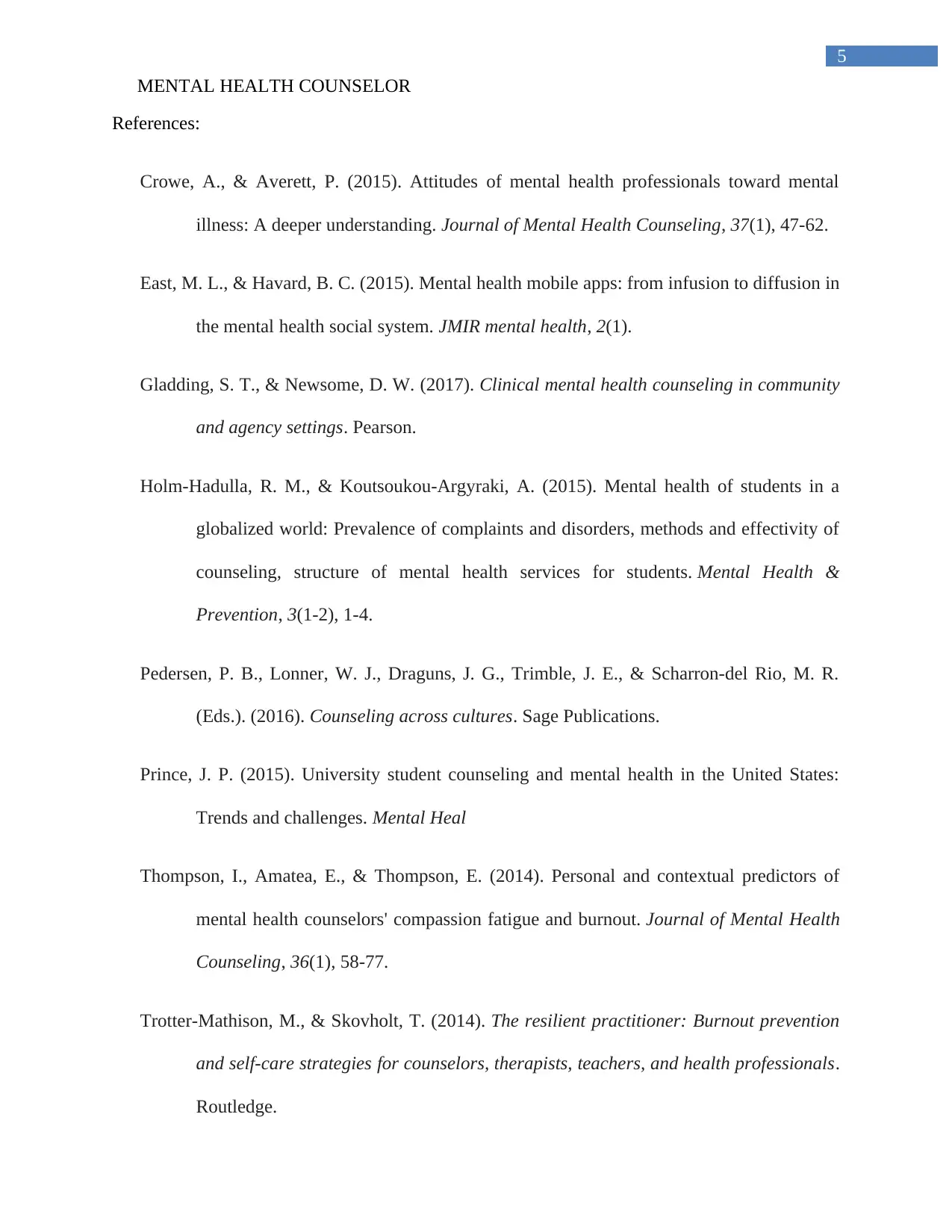
5
MENTAL HEALTH COUNSELOR
References:
Crowe, A., & Averett, P. (2015). Attitudes of mental health professionals toward mental
illness: A deeper understanding. Journal of Mental Health Counseling, 37(1), 47-62.
East, M. L., & Havard, B. C. (2015). Mental health mobile apps: from infusion to diffusion in
the mental health social system. JMIR mental health, 2(1).
Gladding, S. T., & Newsome, D. W. (2017). Clinical mental health counseling in community
and agency settings. Pearson.
Holm-Hadulla, R. M., & Koutsoukou-Argyraki, A. (2015). Mental health of students in a
globalized world: Prevalence of complaints and disorders, methods and effectivity of
counseling, structure of mental health services for students. Mental Health &
Prevention, 3(1-2), 1-4.
Pedersen, P. B., Lonner, W. J., Draguns, J. G., Trimble, J. E., & Scharron-del Rio, M. R.
(Eds.). (2016). Counseling across cultures. Sage Publications.
Prince, J. P. (2015). University student counseling and mental health in the United States:
Trends and challenges. Mental Heal
Thompson, I., Amatea, E., & Thompson, E. (2014). Personal and contextual predictors of
mental health counselors' compassion fatigue and burnout. Journal of Mental Health
Counseling, 36(1), 58-77.
Trotter-Mathison, M., & Skovholt, T. (2014). The resilient practitioner: Burnout prevention
and self-care strategies for counselors, therapists, teachers, and health professionals.
Routledge.
MENTAL HEALTH COUNSELOR
References:
Crowe, A., & Averett, P. (2015). Attitudes of mental health professionals toward mental
illness: A deeper understanding. Journal of Mental Health Counseling, 37(1), 47-62.
East, M. L., & Havard, B. C. (2015). Mental health mobile apps: from infusion to diffusion in
the mental health social system. JMIR mental health, 2(1).
Gladding, S. T., & Newsome, D. W. (2017). Clinical mental health counseling in community
and agency settings. Pearson.
Holm-Hadulla, R. M., & Koutsoukou-Argyraki, A. (2015). Mental health of students in a
globalized world: Prevalence of complaints and disorders, methods and effectivity of
counseling, structure of mental health services for students. Mental Health &
Prevention, 3(1-2), 1-4.
Pedersen, P. B., Lonner, W. J., Draguns, J. G., Trimble, J. E., & Scharron-del Rio, M. R.
(Eds.). (2016). Counseling across cultures. Sage Publications.
Prince, J. P. (2015). University student counseling and mental health in the United States:
Trends and challenges. Mental Heal
Thompson, I., Amatea, E., & Thompson, E. (2014). Personal and contextual predictors of
mental health counselors' compassion fatigue and burnout. Journal of Mental Health
Counseling, 36(1), 58-77.
Trotter-Mathison, M., & Skovholt, T. (2014). The resilient practitioner: Burnout prevention
and self-care strategies for counselors, therapists, teachers, and health professionals.
Routledge.
⊘ This is a preview!⊘
Do you want full access?
Subscribe today to unlock all pages.

Trusted by 1+ million students worldwide
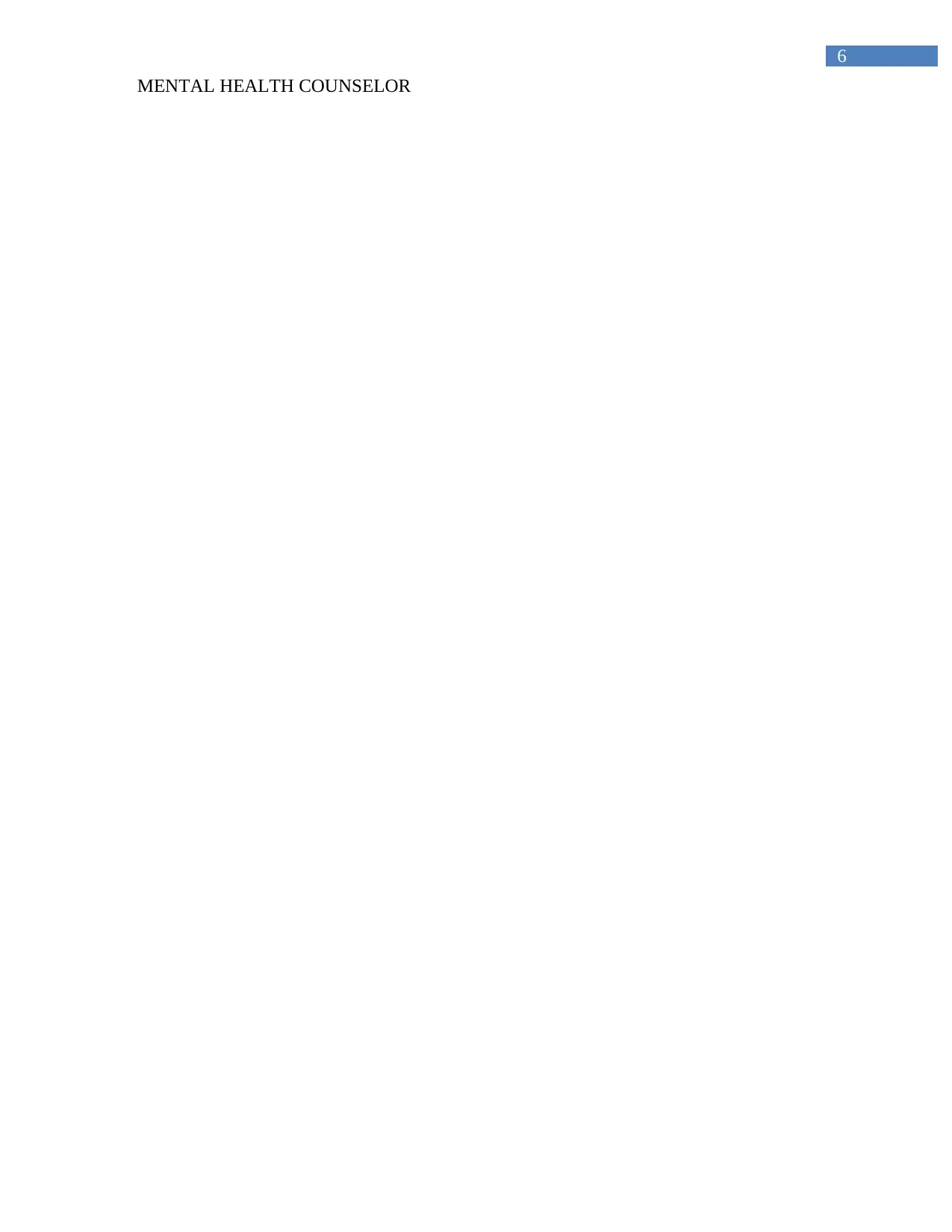
6
MENTAL HEALTH COUNSELOR
MENTAL HEALTH COUNSELOR
1 out of 7
Related Documents
Your All-in-One AI-Powered Toolkit for Academic Success.
+13062052269
info@desklib.com
Available 24*7 on WhatsApp / Email
![[object Object]](/_next/static/media/star-bottom.7253800d.svg)
Unlock your academic potential
Copyright © 2020–2025 A2Z Services. All Rights Reserved. Developed and managed by ZUCOL.





